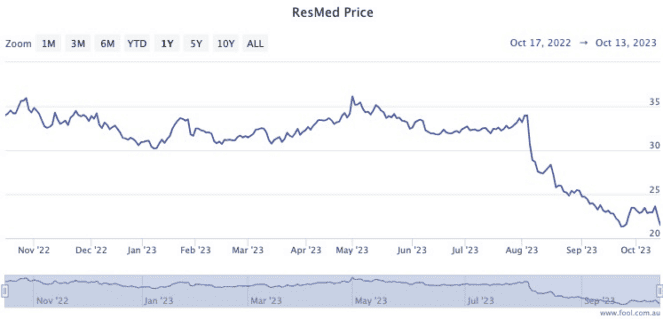The reality of investing is that many popular S&P/ASX 200 Index (ASX: XJO) stocks don't see heavy discounting very often.
There are not many secrets with public companies, so if a business has excellent long-term prospects, you are not the only investors keen on buying the stock. Hence the price always remains elevated.
That's why if you see a significant dip for one of these, you need to seriously consider pouncing. You might not get another chance for a while.
Multiple experts are making that argument for sleep apnoea device maker Resmed CDI (ASX: RMD) at the moment.
The stock has dived more than 34% since the August reporting season.

Airlie Funds senior equities analyst Vinay Ranjan reckons now is "a rare opportunity to invest in one of the highest quality companies on the ASX".
"While we are unlikely to pick the bottom, we believe the company is trading well below its intrinsic value," Ranjan said on the Airlie blog.
"While we are not medical experts, we consider the significant de-rate to be an overreaction."
What caused Resmed shares to freefall?
The team at Forager Funds recently bought ResMed shares on the dip.
The price fall was initially triggered by below-expectations annual results, Forager analysts said in its quarterly report.
"While revenue growth has been excellent… Resmed's cost base has been growing just as quickly."
But a devastating second blow would come a few days later when the market panicked over the weight loss power of new GLP-1 drugs such as Ozempic.
The idea is that if new weight loss treatments reduced the rate of obesity, the market for sleep apnoea devices would shrink.
"The drugs work and have the potential for widespread societal benefits."
The sell-off is overdone. Time to buy
However, both the Forager and Airlie analysts believe Resmed shares have been excessively punished over the GLP-1 threat.
The Forager report noted that those new drugs are "not a silver bullet that 'cures obesity' or gets rid of your sleep apnoea".
"We will be watching closely but expect sleep apnoea will still be a bigger problem in 20 years' time than it is today."
The team could not resist taking advantage of the market panic.
"We have made an initial investment at the most compelling valuation ResMed has traded at since 2016 — 21 times earnings."
Ranjan pointed out that many sleep apnoea patients are not obese anyway.
"Based on our conversations with sleep physicians and the company we estimate one-third of OSA [obstructive sleep apnoea] patients are not obese," he said.
"We also don't expect GLP-1s to fully eliminate OSA in all cases (the drugs may simply reduce severity). As a result, we think it's more likely you could have a scenario where a combination of GLP-1 drugs and CPAP therapy are prescribed as treatment."









